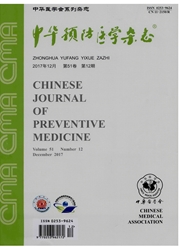

 中文摘要:
中文摘要:
目的 了解准噶尔盆地大沙鼠(Rhombomys opimus)感染鼠疫耶尔森菌(鼠疫菌)的组织病理与超微病理变化。方法 于2011年在新疆准噶尔盆地捕获40只实验大沙鼠,经实验室人工饲养6个月,且实验动物血清采用鼠疫菌F1抗体间接血凝法检测为阴性。鼠疫菌(编号:2504,属中世纪型)由新疆维吾尔自治区疾病预防控制中心2005年分离自准噶尔盆地鼠疫自然疫源地的活体大沙鼠,其毒力测定为半数致死量(LD50)〈10 CFU/ml。实验共设7个实验组和1个对照组,并采用随机数字法将40只大沙鼠平均分到8个组。实验组大沙鼠分别接种按10倍梯度稀释成的7.4×10^5、7.4×10^6、7.4×10^7、7.4×10^8、7.4×10^9、7.4×10^10和3.0×10^11 CFU/ml浓度菌液,对照组接种生理盐水,接种量均为1 ml。收集所有感染鼠疫菌大沙鼠的心脏、肝脏、脾脏和肺脏组织,分别处理后进行光学显微镜镜检和透射电子显微镜观察。结果 7.4×10^8~3.0×10^11 CFU/ml实验组均引起大沙鼠特异性感染死亡,感染动物肝脏呈点状坏死伴脂肪变性,肝细胞核内小管增多,细胞器分布不均。脾脏淋巴组织呈反应性增生,血窦腔内可见较多中性粒细胞,吞噬细胞内可见被吞噬的细菌。心肌细胞轻度变性、横纹模糊,肌细胞核基质密度降低,肌原纤维排列松散。肺脏可见血管扩张、充血,肺泡腔内呈Ⅰ型上皮细胞脱落。大沙鼠感染7.4×10^5~7.4×10^7 CFU/ml鼠疫菌后未出现特异性感染死亡,实质器官的组织病理与超微病理相较于7.4×10^8~3.0×10^11 CFU/ml组改变轻微。结论 鼠疫菌可以引起大沙鼠实质器官的组织病理和超微病理发生改变;肝脏和脾脏可能是鼠疫菌感染大沙鼠的主要靶器官。
 英文摘要:
英文摘要:
Objective To understand the histopathological and ultrastructural pathology changes of great gerbils in the Junggar Basin to Yersinia pestis infection.Methods Forty captured great gerbils from the Junggar Basin that tested negative for anti-F1 antibodies were infected. The Y. pestis strain 2504, isolated from a live great gerbil in the natural plague foci of the Junggar Basin in 2005 with a median lethal dose (LD50) of 〈10 CFU/ml, was used in this study. Forty great gerbils were divided into seven infection groups and were subcutaneously infected with 7.4×10^5, 7.4×10^6, 7.4×10^7, 7.4×10^8, 7.4×10^9, 7.4×10^10, or 3.0×10^11 CFU/ml of 2504. One milliliter of physiological saline was injected in the noninfected group as a control. We collected the liver, spleen, heart, and lung from all animals for histopathologic and ultrastructural pathology examination.Results Great gerbils in the 7.4×10^8-3.0×10^11 CFU/ml groups did not survive and exhibited pathological changes and altered ultrastructural pathology. The liver tissue of infected great gerbils showed spotty necrosis and fatty degeneration, intranuclear canaliculi with increased hepatocytes, and uneven distribution of organelles. Additionally, reactive proliferation of lymphoid tissue in the spleen, blood sinusoid lacunae with neutrophil infiltration, and phagocytosed bacteria in phagocyte cells were observed. Myocardial fiber hypertrophy and interstitial indistinction, nuclear matrices decreased in cardiac myocytes, and loose arrangement of myogenic fibers in myocardial cells were also observed. Angiectasia, capillary congestion, and tissue necrosis were found in the lung. No significant difference in histopathological and ultrastructural pathology in the parenchymal organ was observed between the 7.4×10^5-7.4×10^7 CFU/ml groups and the 7.4×10^8-3.0×10^11 CFU/ml groups, and no specific death caused by Y. pestis infection was apparent in the 7.4×10^5-7.4×10^7 CFU/ml groups.Conclusion Y. pestis infection altered tissue and ultrastructural
 同期刊论文项目
同期刊论文项目
 同项目期刊论文
同项目期刊论文
 期刊信息
期刊信息
